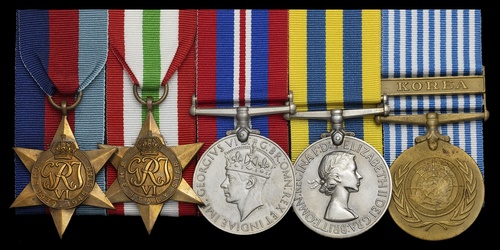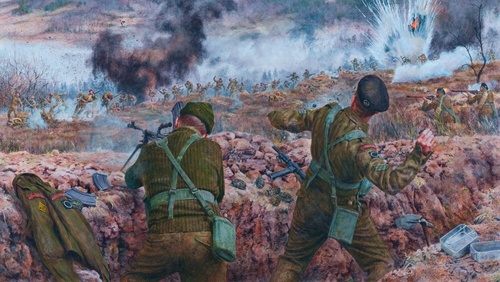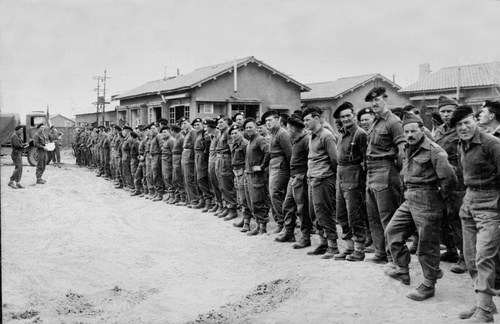Auction: 25001 - Orders, Decorations and Medals
Lot: 93
The campaign group of six awarded to Private W. R. P. Seymour, Gloucestershire Regiment, late Royal West Kent Regiment
Seymour was wounded in action in Italy in October 1944 and went on to be one of the 'Glorious Glosters' who was taken a Prisoner of War with 8 Platoon, 'C' Company at the Battle of Imjin River, April 1951
1939-45 Star; Italy Star; War Medal 1939-45; Korea 1950-53 (3959731 Pte. W. R. P. Seymour. Glosters.); U.N. Korea 1950-54, mounted court-style as worn, good very fine, together with his United States Presidential Unit Citation riband (6)
William R. P. Seymour was born in Dublin in 1923 and during the Second World War served in the 5th Battalion, Royal West Kent Regiment. He was wounded in action on 20 October 1944, when the unit were thrown to attack the Gustav Line. He was transferred to the Army Reserve, by this time his family living at Ravenhill Avenue, Belfast.
Recalled to the Army with the outbreak of the Korean War, Seymour would served with the 8 Platoon, 'C' Company, 1st Battalion, Gloucestershire Regiment. He shared in the actions at taken Prisoner of War at the Battle of Imjin River, 22-25 April 1951.
As part of the United Nations Forces, the 1st Battalion was despatched to Korea in 1950 when the Communist North Koreans invaded South Korea without warning. Later, a Chinese Communist Army came to the assistance of the North Koreans. ln April 1951 the British 29th Infantry Brigade was holding a wide defensive position behind the lmjin River. The Glosters occupied a vital part of this front, astride the main track to Seoul, the capital city of South Korea, which was the traditional invasion route from the north.
For days a Chinese attack had been expected and on the evening of 22 April, small parties of the enemy were observed approaching and then crossing the wide river bed. A patrol of 'A' Company at "Gloucester Crossing" did great execution to these parties, but soon the trickle of Chinese became a flood, and by 2330hrs the patrol had used up all its ammunition and was recalled.
By 0300hrs on the morning of the 23rd, St George’s Day, 'A' Company’s position on a commanding feature named Castle Hill was under extremely heavy attack, as was 'D' Company on their right, and an hour later 'B' on the right of 'D' was equally engaged. After six hours fighting, much of it hand to hand, 'A' Company was driven back from Castle Hill and a desperate but unsuccessful counter-attack was launched to retake it, during which Lieutenant Curtis lost his life but gained a posthumous Victoria Cross. 'D' Company’s position was now untenable, so it was later withdrawn after further fighting, together with the remnants of 'A'. 'B' Company was later pulled back, and the whole Battalion now took up position on the hills around the village of Solma-Ri.
The Chinese did not closely follow up this withdrawal, but meanwhile very large numbers of them had crossed the river and infiltrated past the Glosters. Their attacks on other parts of the front had been equally severe, and now the other United Nations units on their flanks had been forced back so that by mid-day the Glosters were completely separated from the rest of the Division, and indeed almost surrounded.
That night 'B' and 'C' companies were heavily attacked, the former being reduced to one officer and 20 other ranks. Early the following morning, Colonel Carne decided to concentrate the remnants of his Battalion on the top of a steep and rugged feature known as Hill 235 on the map, but now as Gloster Hill (presumably one and the same 'Battalion Hill as recalled by Seymour). On the 24th no major attack developed against the Battalion, but two relieving columns of armour and infantry, sent forward by Division, failed to fight their way through. The Glosters were now completely cut off, but although short of ammunition and water they were in good heart and determined to hold out for as long as possible.
ln the very early hours of the 25th, the Chinese launched an all-out attack on the hill wave after wave of shooting, screaming men surged forward, regardless of the defenders fire. Chinese trumpets directed them and encouraged them. ln order to confuse them it was decided that one of the British bugles should be blown. The adjutant then ordered Drum Major Buss to sound his bugle and on being asked what calls, replied everything except Retreat. Of all the calls the Long Reveille was the one which made the deepest impression. The battle continued with every weapon involved, and then at 9 o'clock a highly successful air strike was delivered by the US Air Force which for the time being halted the Chinese decisively. lt was during this pause that the Colonel received instructions over the wireless to fight his way out, his job done, and Brigadier Brodie wrote in the Operations log book at Brigade HQ 'Nobody but the Glosters could have done this.'
The Battalion split up into groups which tried to work their way back independently, but the United Nations forces were now consolidating after their withdrawal fully seven miles to the rear, and only one party succeeded in reaching them, the rest being killed or captured. Out of 750 men of the Battalion only 150, including the rear echelon, remained on which to rebuild the unit. Lieutenant Colonel Carne, who survived his harsh imprisonment, later received the V.C., and the Battalion was awarded the Presidential Unit Citation to commemorate its magnificent stand. The Queen graciously granted permission for the emblem of the Citation to be worn by all members of the Regiment.
Having been captured, Seymour was one of a band of British and American captives who were (probably) forced to sign a Statement of Protest against the bombing og a POW Camp in North Korea, their names being broadcast on Peking Radia at 0900hrs on 9 November. After his return home on his debrief he gave two statements:
'My reason for my statement is that Pte. R. T. Othen was in my Squad and was taken to Hospital where he died.'
'Pte. E. K. Gudge was wounded on C. Coy. 8 Plt. position and when we had to withdraw back to what was so called Batt Hill [Gloster Hill] he was taken to the RAP where he died on the 24.4.51. Who was with him when he died I have forgot. Best we were told that he had died before we moved to the last position.'
Sold together with a letter from RHQ and copied research.
Subject to 20% VAT on Buyer’s Premium. For more information please view Terms and Conditions for Buyers.
Estimate
£1,000 to £1,400
Starting price
£800









